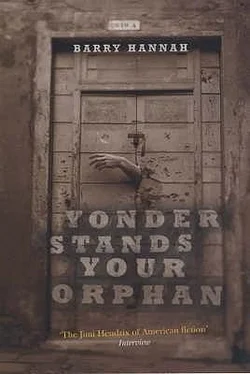He did not know the term gigolo . Something about him canceled scruples in women. He didn’t know what that was either but accepted it as a birthright. For reasons he didn’t ponder, he did not love but found the language of love came fluid to him. He never even had the puppy kind of love. He was jaded before he had a crush. He was a pimp before he comprehended what a pimp was. It was just that women liked him, especially the marginal breeds. They shed all natural jealousies, even pride, for him. They broke open on him. They went with other men and gave him half the money.
His name was Man Mortimer. Death by sea or by mother. He was horrified of progeny. Nothing was busy or brooding enough to follow him.
Seven years ago the girl from his early days, a store owner’s daughter, had come to him with a child six years old she claimed was his. She was on hard times, drugged, worn, emaciated. She thought the son would bring him back to her. He denied fatherhood.
They were at an old gravel bed outside St. Louis. She walked back to his car where the boy was waiting and shot him in the forehead. Mortimer was not aware she had a pistol. Now she sat in the car beside the body of the child. The night silent, hot, the moon white somewhere. Mortimer’s expensive loafers on the gravel. He always needed expensive shoes and boots. He stood looking in the foggy windshield at the woman behind it until she raised the pistol and shot herself in the temple. He looked away, and for a long while he watched lightning reveal shivering bushes in the field next to him. He couldn’t be sure this was not a dream. Even while he dragged them both to the trunk.
A thin highway dog lurked at the edge of the trunk light. Skeletal but with full paps. She smelled the blood, thrust out her muzzle, wanting to eat but fearing him. He took pity on her and intended to use the pistol on her. With this thought he assured himself he was a right man. But she ran off into a dark field of sedge.
He drove southward with his burdens, hating that his shoes were scuffed from labor. These sordid details, these fluids. He could never forgive her. She had shown him hell.
“She just wanted me to watch, is all,” he said aloud. “It was already done when she got here. She wanted to ruin me. Well.”
He felt no pain outside this nasty theater of his mind. But he felt a surge of power. A tougher man seemed to drive the car now. He gathered himself into this new form. He took some pride in the force of his withdrawal from women. He had driven some into lesbianism. Or supposed he had. He had barely laid a hand on any of them. He believed in the mind.
Acquaintances in Vicksburg would help him bury his old history.
He wondered vaguely, and not for the first time, whether his departure had destroyed his mother. A person like me don’t come along every day , he thought. You just got to watch yourself. Don’t ever mistake that I’m like you .
It was only when his looks started to go, at age forty-three, that he became hungry for all the life he had missed. Something had made him grow up too fast, and he cursed that thing now. He fled from one of his three houses to the other, the next house always a getaway from the last. The people he knew were made curious by his changes this last year. With them he seemed to be doing some imitation of warmth, friendship, trust. Childish, stilted gestures, as if studied from some old book on stagecraft. They had no idea what he had on his mind.
When the man who owed him the boat at last came up, Mortimer told him to stay in it. He wanted driving somewhere.
“You see that pontoon barge way out there? I want you to follow it, see where they get off it.”
“Those children? Them is orphans from the new camp.”
“Orphans? Well. Let’s see where they land. I might could help them.”
The man was surprised. Then he looked at Mortimer’s feet. “Careful. Them ain’t no boat shoes. They like for selling cars in.”
“Just drive it. If you can stay quiet, you might be earning this boat back.”
The man was very warm to this idea. Parting with the boat was breaking his heart. He should have stuck with it and fishing. A simple soul who don’t ask much more than God’s waters. But no, he had to get off into gambling, borrowing and the night sweats.
The adult couple were weary, the same idiot glassy beams in their faces as they watched the children disembark to the pier. They seemed unconnected to the children individually but joined to their collective oversoul. Only about six of the children were tame. They peered at Mortimer and his pilot coming up in the boat, but he could not be sure they quite perceived him. The huge smiles were already on them when he came, and they seemed only a little puzzled.
“I saw you across the lake.” Mortimer pointed. “A voice said to me, ‘Now what can I do to help out?’ And it not even Christmas. I said, ‘I bet these good folks could use a hand.’”
“A hand?” the husband said.
“Myself, I had no mother or daddy either. I know where you’re coming from.”
With their great smiles, they seemed unequipped to deny him. Like they had already assented when he was on the way over. Both of them nodded. Mortimer knew they were damaged, and this fact pleased him. He felt to be their senior officer the minute he set foot on the pier, looking for where those two girls could have got off to. They were over to the side, watching him, sullen, too old for this camp, their legs jammed to the grass in a stance both defiant and beckoning. Street-corner women.
Mortimer found out he had much in common with the male adult. Their pain. As Mortimer walked up the pier to the lawn with the couple, the man in the boat whispered, “I heard a voice out there too. It said, ‘Freddy, watch out. You driving up some nasty river with this shark.’”
DEE ALLISON HELD HER BRA AND PANTIES IN ONE HAND AND watched the reflection of herself in the blank television screen. She wanted to see if she still had powers, and she was satisfied, looking directly at her breasts, stomach, the lush dark curls of her pubic hair.
She was only thirty-six. Her husband was a memory since the birth of her baby girl, but she understood not being here. She was almost not here herself. Nor anywhere. At least he sent money. He was doing well. She didn’t care what he did or where he was. She was just about exactly what she looked like, a phlegmatic starlet, made lazy by her rolling daydreams. But cheerful. Life had not beaten her. She was glad.
Each one has his master, and Mortimer had at last met a woman who moved him in all ways. Who could be visited but never occupied. He gave her money, a car, a television she rarely watched, drugs she threw away, drink she barely uncapped. She never asked for anything and was indifferent to her station in life, that of a nurse and single mother of four, in a sagging house on the scrub side of the lake not far from the new orphans’ camp. He met her needs for animal passion, but he knew another man could furnish her just as well. Dee was heedless of the fact that he was very special, or that she was.
He told her dreadful tales about his business. The whores, the sharking, extortion, the ruined lounge rats who ran to do his will. With her, he had quit his laconic muttering. He had gone full-bore to revelations, which startled him. There was a desperate poet suddenly grafted onto him. She barely responded.
She might writhe with him in bestial greed, but otherwise she seemed the nun of apathy. She was wearing him out both ways. Having her and not having her so quickly.
The truth was, she had her daydreams and did not live much outside them. Television bored her, but she sat wishing musical scores and images onto its blank screen. She worked at the Onward Rest Home, called Almost There by wags in the county, and many remarked that she was too bright and lovely to stop there. She was not trash, she was clean and dressed well. Her four children lived with her. Two boys, a near man of twenty, and Emma, a baby girl with the disposition of an angel and startling beauty, often baby-sat by a nearby Mennonite couple when she was out on the town. She paid little attention to her home and let her children run wild.
Читать дальше











